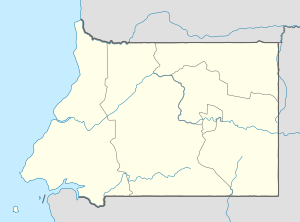Cogo, Equatorial Guinea facts for kids
Quick facts for kids
Kogo
|
|
|---|---|
| Country | |
| Province | Litoral |
| Elevation | 115 m (377 ft) |
| Population
(1994)
|
|
| • Total | 4,607 |
| Time zone | UTC+1 (UTC/GMT+1) |
| Climate | Am |
Kogo (pronounced KOH-goh), also sometimes called Cogo or Koszho, is a town in Equatorial Guinea. It used to be known as Puerto Iradier. Kogo is located on the Muni estuary, which is where the Muni River meets the ocean. It's in the Litoral province, and it's the southernmost town in that area.
Kogo is known for its old buildings that show Spanish colonial style. These buildings are partly ruined, but they still show the town's history.
About Kogo
Kogo is about 121 kilometers (75 miles) from Bata by road. If you travel through Acalayong, it's a bit shorter, about 117 kilometers (73 miles). The town is surrounded by rivers. The Congüe River is to the east and southeast, and the Mitemele River is to the west and southwest. Both of these rivers flow into the Muni Estuary. Because of these rivers, Kogo can sometimes look like an island, even though it's actually a peninsula (a piece of land almost surrounded by water).
Life in Kogo
Near the port in Kogo, there's an island called Evele Island, but people don't live there. Many people in Kogo, especially those living near the coast, rely on fishing to get food for themselves and their families. The Muni estuary was once a very important place for travel. It was a main way for people to go to and from the neighboring country of Gabon. This made it a big source of income for the town.
History and Important People
There is a large monument in Kogo dedicated to Manuel Iradier. He was the first European settler in the area, arriving in 1874.
Kogo is also the hometown of Wenceslao Mansogo. He is a well-known doctor and community leader.
The book Chromosome 6, written by Robin Cook in 1997, has its story take place in Kogo.
Sister Cities
Kogo has a "sister city" relationship with another city. This means they share cultural ties and friendly connections.
See also
 In Spanish: Cogo para niños
In Spanish: Cogo para niños
 | Kyle Baker |
 | Joseph Yoakum |
 | Laura Wheeler Waring |
 | Henry Ossawa Tanner |


